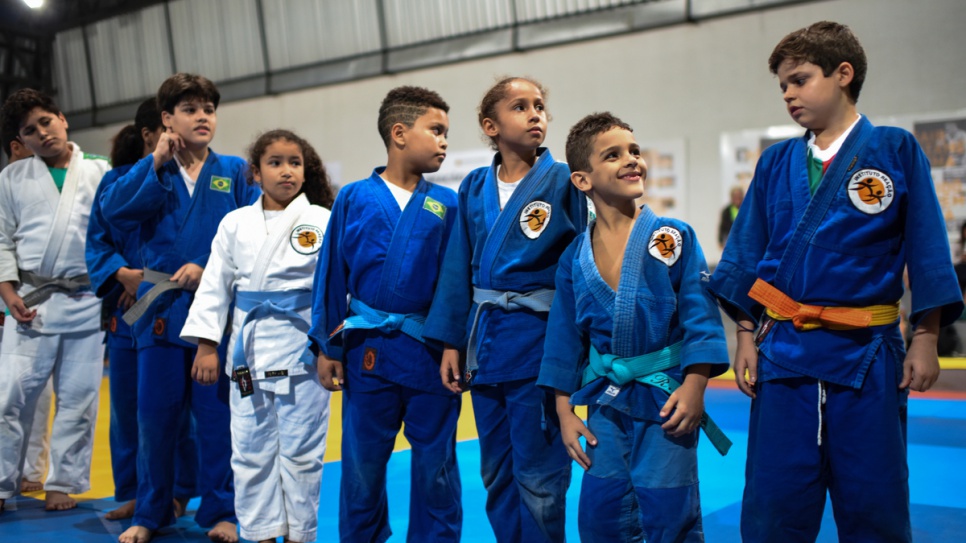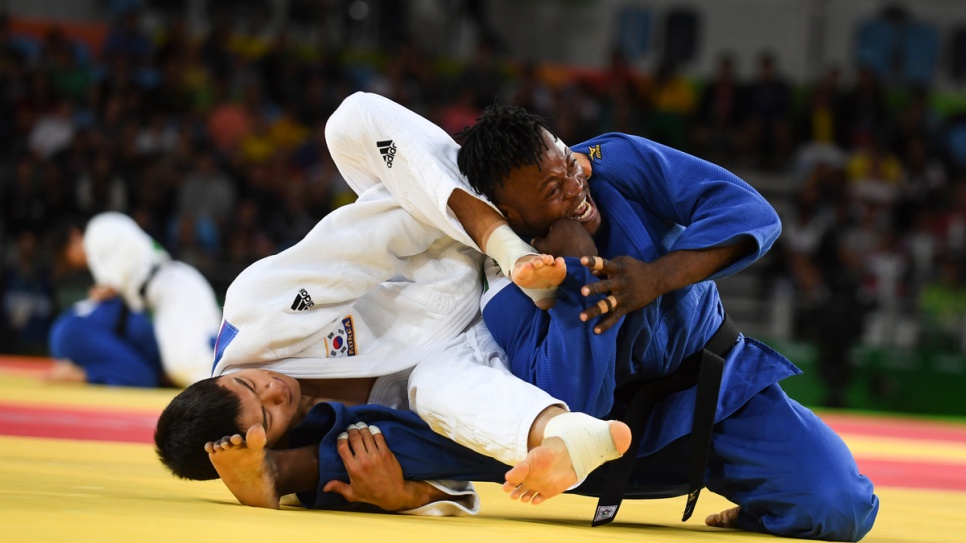As Games near end, Team Refugees looks to the future
After competing at the Olympics, Yolande and her teammates hope they have turned the page on the past.

Yolande Mabika back at her judo training centre in Rio de Janeiro this week. © UNHCR/Benjamin Loyseau
RIO DE JANEIRO, Brazil – The nightmares have gone. But the memories remain.
Yolande Mabika remembers running for her life when rebels attacked her home in Bukavu, in eastern Congo, more than 20 years ago. She was eight. That was the last time she saw her family. They had scattered in other directions.
Fresh from competing in judo at the Olympics, as a member of the first-ever refugee team, Yolande, now almost 29, thinks she may have finally turned the page on the past.
“I still think of Congo, but less and less – it is in the past for me now and I no longer think of my family all the time. The memories are there, but the pain has gone. I have accepted I won’t see them again,” she told UNHCR, the UN Refugee Agency, in an interview.
"I no longer think of my family all the time."
Yolande was eventually picked up by a military helicopter, taken to the capital, Kinshasa, and placed in a refuge for abandoned children and orphans. There, she cried a lot at first.
Then, she started judo as a form of therapy. It changed her life. She says she developed a “strong heart.” She also began the long journey that ended at this month's Rio games.
If that chapter of her life is now finally over, then it will be, for her, the most important legacy of these Games.
“Brazil is my home now and I want to stay here and build a new life… I would like to work with young girls like me who had no luck, and help them overcome the same type of problems I have had,” she explained.
First, she has unfinished business in the arena.
“I got into this competition and the whole world knows me now. I will not stop like this. I'll carry on training. I'll compete, to be stronger,” she vowed.
“That was my first fight since I became a refugee in Brazil… I will not stop. Now the whole world knows that I am an Olympic athlete and I'll carry on training to fight stronger in every competition.”
Yolande was speaking at the judo centre in a down-at-the-heels neighbourhood of Rio de Janeiro, where she trains with fellow Congolese refugee and friend Popole Misenga, 24, who was also a judoka on the Refugee Olympic Team.
In 2013, the two travelled together to Rio to compete at the World Judo Championship for Democratic Republic of the Congo. Their coach confiscated their passports and gave them limited access to food – as he had before. Fed up with years of abuse, they fled the hotel together and applied for asylum.
Both were eliminated early on in this year's Olympic competition. Nevertheless, the two are still role models for dozens of young, aspiring Brazilians at the gym who identify with their story of overcoming hardship through hard work and persistence.
“They are the tales of impoverished people worldwide, not just refugees."
Indeed, the entire refugee team, which includes runners from South Sudan and Ethiopia and swimmers from Syria, has inspired people all over the world. Their stories of triumph over adversity have caught the imagination, particularly in the host country, Brazil, where many people also face tough struggles just to survive.
The athletes have touched hearts with tragic personal stories and modest hopes and aspirations.
“They are the tales of impoverished people worldwide, not just refugees. That is why people warm to them so much. It is not just being on this or that side of a border – it is the struggle against huge odds,” said Tegla Loroupe, the Kenyan world-record-winning runner, who was selected by the International Olympic Committee (IOC) to head the refugee team. “I feel for them like my children.”
Rio de Janeiro demonstrated this support this week by unveiling a mural, painted by street artists, of all 10 members of the refugee team. It covers the walls of an old warehouse in the previously neglected old port area, which the City Council intends to rejuvenate as an enduring tribute to the 2016 Olympics. It will last long after the athletes, spectators and media have gone.
"This is going to be the real legacy of these Games," said Robert Malengreau of the city's culture department. "The first-ever refugee team is one of the main legacies of the Games, and this mural fits in and perfectly depicts that."
At their first appearance at the centre since the Olympic competitions, fellow judokas, young and old, eagerly gathered around, firing questions at them about the experience.
“It is my dream to achieve what these Congolese athletes did,” said one young Brazilian girl. “I want to be part of the Brazilian team, to be an Olympic Champion, world champion… But when I see Yolande and Popole fighting, they are very disciplined. They decided they wanted to fight in the Olympics and they did.”
Rose Nathike Lokonyen, a 23-year-old South Sudanese who led the team into the stadium at the Opening Ceremony behind the IOC flag, said all the team members were delighted at the warm reception they received, but wanted the opportunity to be able to carry on training and improving.
“Me and all the Refugee Olympic Team's members are very happy to compete at these Olympics, the first to have a team of refugees. We represent millions of refugees,” she said. “I would like to represent my country in the Olympic Games, but when the war is finished. If there is still conflict, it will be very hard. They must be able to reach peace. Peace is what we all need.”








